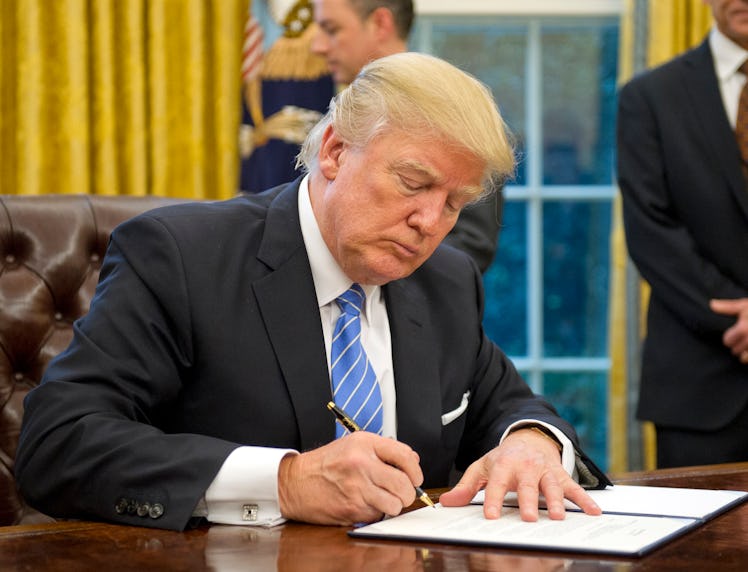
The Trump Administration's Next Move On Immigration Could Have A Big Impact On Refugees
Have you heard? The Trump administration is reportedly making another move on immigration, one that will likely make it harder for foreign nationals to relocate to the United States. As you can probably imagine, the news of possible Trump administration plans to close international immigration offices hasn't been that well-received. Elite Daily reached out to the White House for comment on the change-up, but did not hear back by the time of publication.
On March 12, The Washington Post reported that the administration will potentially close nearly two dozen U.S. Citizenship and Immigration Services (USCIS) field offices, in a move that USCIS says could save millions of dollars year. As it currently stands, USCIS has about 70 staffers in the international offices, who provide services and solve what the Post calls a "wide array of problems," including facilitating international adoptions, coordinating legal documents for members of the military or spouses of American citizens, or even helping out people who lose very important documents (like green cards). Per the USCIS website, the international offices offer specific services on things including refugee application documents, adoption processing, or even review of a denied refugee application.
USCIS Director L. Francis Cissna wrote an email obtained by The Los Angeles Times announcing the plan to close the offices and hopefully shift their duties to the State Department, apparently in order to focus on an immigration backlog. The email said, in part:
I believe by doing so, we will better leverage our funds to address backlogs in the United States while also leveraging existing Department of State resources at post. Change can be difficult and can cause consternation. I want to assure you we will work to make this as smooth a transition as possible for each of our USCIS staff while also ensuring that those utilizing our services may continue to do so and our agency operations continue undisrupted.
In a statement shared with Elite Daily, USCIS Spokeswoman Jessica Collins said that the move had been discussed internally, with a goal of "maximiz[ing] USCIS resources that could then be reallocated, in part, to backlog reduction efforts." She also said that USCIS would work with the Department of Homeland Security (DHS) and the State Department to coordinate work between the agencies, to "ensure no interruption in the provision of immigration services to affected applicants and petitioners.” The State Department told Elite Daily by email, "Should USCIS overseas offices be phased out, we anticipate a smooth transition and continued efficient processing of USCIS-related work at all of our missions overseas."
Critics, however, aren't so convinced. Some have said the possible closure of the offices is simply another attack by the Trump administration on immigration, which has attempted to limit asylum-seekers' entry to the United States, placed bans on travel from several Muslim-majority countries, and canceled programs giving legal status to young immigrants brought to the United States as children.
“This is not an immigration-friendly administration,” George Bruno, an immigration lawyer and former ambassador to Belize told the Post. “The service currently being provided is awful, and I can only imagine it’s going to deteriorate further with these office closures.” USCIS did not offer further comment regarding the quality of current service, but did note that the potential move was not expected to impact refugee processing.
According to The Hill, Rep. Pramila Jayapal (D-Washington) brought up the "serious consular needs" for the services these offices supply. Regarding cuts to consular visa services, Jayapal said:
We have serious consular needs around the world. As someone who came to this country on a visa for 17 years, I know what that's like to stand in a visa line. People around the world depend on these services.
Oof. On the other hand, it looks like the USCIS and the State Department are still working out how to transfer services, so we'll just have to see how that pans out.